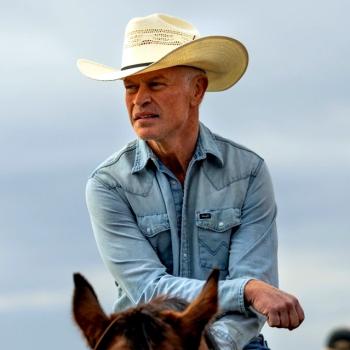Editors' Note: This article is part of the Patheos Public Square on Faith and the Election. Read other perspectives here.
We Muslims commonly assert that Islam is comprehensive. Our faith should inform our every opinion and action, from the religious to the mundane. Politics is no different, and if we hold to this mentality then it should be even more important in a democracy. In choosing who will represent us and effectively govern our country, we each bear some responsibility for the decision we make at the ballot box.
I would usually argue that choosing between the Republican and Democratic platforms is not a morally black-or-white issue. Both parties are intent on creating a better American society and each sees itself as a champion for one set of values our country needs. Often they share the same goals for bettering our society as well, such as the elimination of poverty and the protection of minority communities. The difference really arises in how they seek to address these issues, and even which communities they consider to be minorities.
As a Muslim, I can understand the existence of political diversity in our community. One Muslim may champion the role of the state in providing social services while another may believe in the unrestrained power of the market to equalize wealth and opportunity. I can also understand how one Muslim may feel compelled to vote for the party that supports traditional marriage while another may believe in the value of secularism and therefore support marriage equality. Just as with any aspect of life, there are a number of ways to conceptualize a problem and potential solution while still respecting the foundations of the faith.
However, this presidential election is far from typical. The traditional lines of logic have been so stretched over the past eight years that the original intentions of preserving and bettering our society no longer apply. Instead fear and frustration are pushing our political climate toward authoritarianism and xenophobia, which has culminated in the candidacy of Donald Trump.
With the peculiar nature of this election comes a defining moment for religious communities of our country; how we vote in November will speak of the values we hold, and ultimately of the religion to which we adhere.
Just as the Lutheran Church in Germany would later bear the emotional burden for supporting the Nazi Party prior to its rise, so too will American religious communities suffer from survivor's guilt in the aftermath of a Trump presidency. This is particularly true if Trump is honest in his intentions to exile 11 million illegal immigrants, stomp out free speech and opposition, and systematically monitor and brand Muslim citizens.
The implications of these policies have yet to be fully explained in a moral light. If we take the deportation of illegal immigrants, for example, we are talking about perhaps the single greatest human rights violation committed in America's history. It is the plundering of personal property, the forced relocation of a population, and the subsequent violations that result from that process.
People do not willingly abandon all that they have worked for only to get on a bus and be sent across the border. There will be resistance in which lives will be lost and that loss will be justified according to a Trump administration. It is also impossible to relocate that many people without housing them at some point, which requires the construction of massive internment camps guaranteed to provide the most squalid living conditions. And once resistance arises in those camps, we will witness the violence Trump's supporters have recently inflicted upon others, except on a massive scale.
If we as a religious community vote for man who supports these atrocities, then we will be held responsible as they transpire. More importantly, our faith will be remembered as that which supported tyranny and oppression. And though we Muslims may claim that Islam does not stand for racism, oppression, or bigotry, our claims will be meaningless in light of our actions.
Religion is not simply a set of ideas and rituals derived from some archaic text. Religion is the living community through which principles are practiced. Living in a democratic society where a community of faithful is tied to their elected politicians makes our religion intertwined with the political decisions we make. From this perspective, "true Islam" is merely a catchphrase that symbolizes one's ideal of the faith. Real Islam is that which is manifested within this life, and that Islam is one that must engage politically with our society.
Because Islam lacks the hierarchical structure of Catholicism, we have no central authority that can openly condemn the building of walls as un-Islamic. How we vote as a bloc will determine what we, as American Muslims, deem to be ethical. Of course this belief extends well beyond the platform of Donald Trump; what we promote as good and condemn as evil, and what policies we debate within that spectrum, encapsulates social issues from homosexual marriage to abortion as well as to economic, administrative, and foreign policy issues.
Fortunately, I can claim the vast majority of Muslims won't be voting for a candidate that would like to see us branded and booted from the country. However, this election provides us the opportunity to ask ourselves what we really stand for and what we really stand against. Ultimately, when presented with the opportunity to influence policy, how will our understandings of Islamic ethics contribute to a better America? If our country does go down the path of bigotry, we may well find ourselves asking, "How can we make America great again?"
6/8/2016 4:00:00 AM




